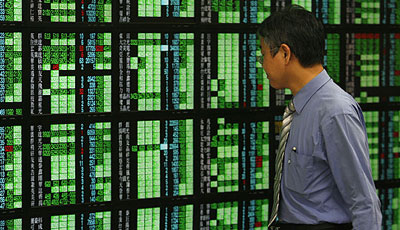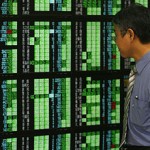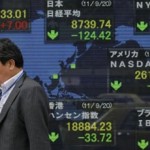Asian shares slump as Ukraine tensions flare

Asian shares slumped on Friday, after flaring Ukrainetensions spoiled investor risk appetite and bolstered the safe-haven yen.
Ukraine’s president said Russian troops had entered his country in support of pro-Moscow rebels who captured a key coastal town, escalating a five-month-old separatist conflict.
The United States on Thursday openly accused Russia of sending combat forces into Ukraine and threatened to tighten economic sanctions, but Washington stopped short of calling Moscow’s latest step an invasion.
“Risky assets were weaker on rising concerns about Russia-Ukraine, as well as weak data out of the euro area,” strategists at Barclays wrote in a note to clients.
MSCI’s broadest index of Asia-Pacific shares outside Japan .MIAPJ0000PUS was down about 0.2 percent, pulling away from Thursday’s high of 515.13, its highest since early 2008. It was on track for a weekly drop but still poised for gain of around 0.3 percent in August.
Japan’s Nikkei stock average .N225 shed 0.6 percent after a spate of weak Japan data. It was also down for the week, bringing its monthly loss to about 1.6 percent.
On top of geopolitical concerns, bond yields worldwide have come under pressure this week on speculation that the European Central Bank would unveil new stimulus steps as soon as next week, to stave off deflation in the euro zone.
The yield on the 10-year German Bund DE10YT=RR plunged to a record low of 0.868 percent on Thursday, and yield on 30-year U.S. Treasury bonds US30YT=RR slumped to a 14-month low of 3.059 percent.
Sources told Reuters on Wednesday that the ECB is unlikely to take new policy action next week unless inflation figures due out later on Friday show the euro zone sinking significantly towards deflation.
German inflation for August released on Thursday came in at a steady 0.8 percent ahead of Friday’s euro zone number, in line with forecasts but well shy of the ECB’s target of close-to-but-just-under 2 percent for the euro zone.
Corresponding Spanish figures saw a slightly smaller-than-forecast drop as revised second quarter GDP held steady.
The data pushed the euro back toward Wednesday’s one-year low of $1.3152 EUR=. It was last at $1.3182, steady on the day, and on track for a monthly drop of over 1.5 percent, after it lost 2.2 percent in July.
The dollar fell to 103.72 JPY=, down slightly and well below its recent seven-month high of 104.49 touched earlier this week, despite a spate of Japanese data that underscored how much the nascent economic recovery is struggling to gain traction.
Japanese household spending fell more than expected, the jobless rate edged up and factory output remained anemic in July after plunging last month, government data showed on Friday, suggesting that soft exports and a sales tax hike in April may drag on the economy longer than expected.
“A rise in the jobless rate could undermine the BOJ’s scenario that an improving job market boosts wages and inflation,” said Minori Uchida, chief FX strategist at the Bank of Mitsubishi-Tokyo UFJ.
“The market appears not much interested in Japanese economy now but that may change towards the year-end as the government has to decide on whether or not it will go ahead with a tax hike planned next year,” he added.
Spot gold XAU= was steady on the day at $1,290.23 an ounce after rising for the third straight session against a backdrop of Ukraine tension. It was on track for its first monthly gain since June.
Brent crude LCOc1 added about 0.3 percent to $102.79 a barrel, but was on track for its second monthly loss as ample supply and softening demand in Europe and China outweighed geopolitical concerns.
(Additional reporting by Hideyuki Sano; Editing by Eric Meijer)
Source: Reuters



























